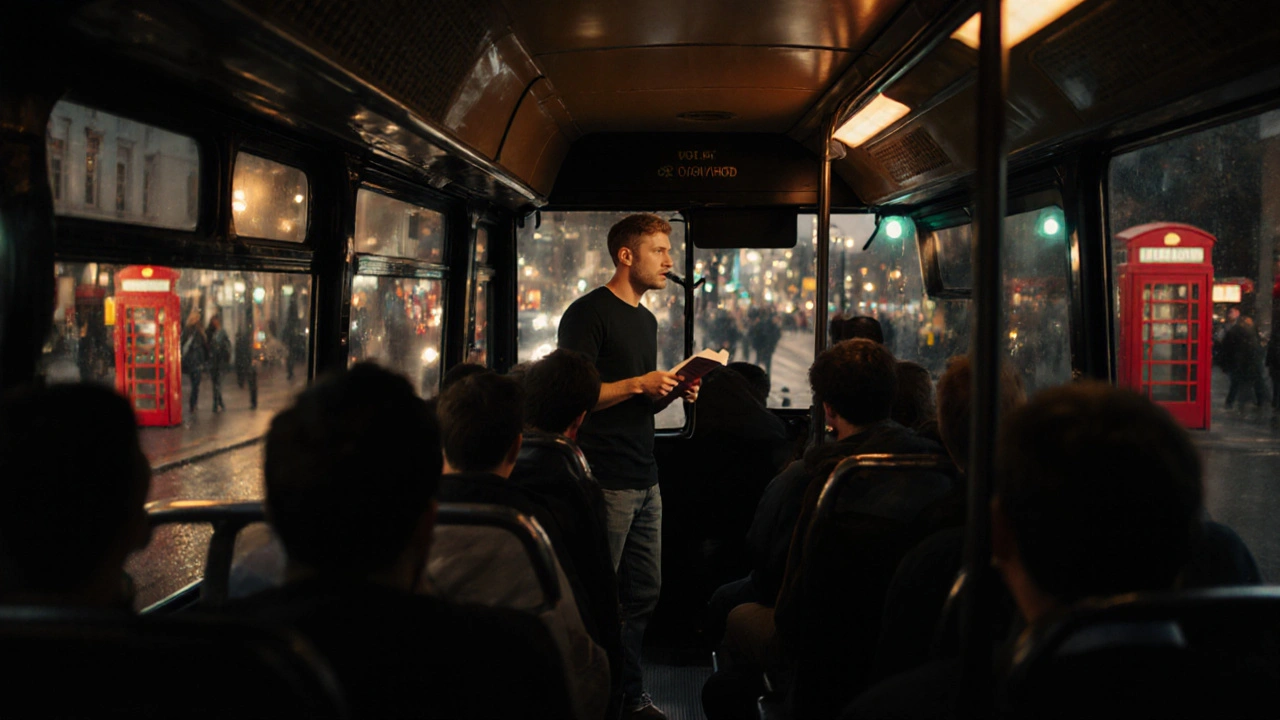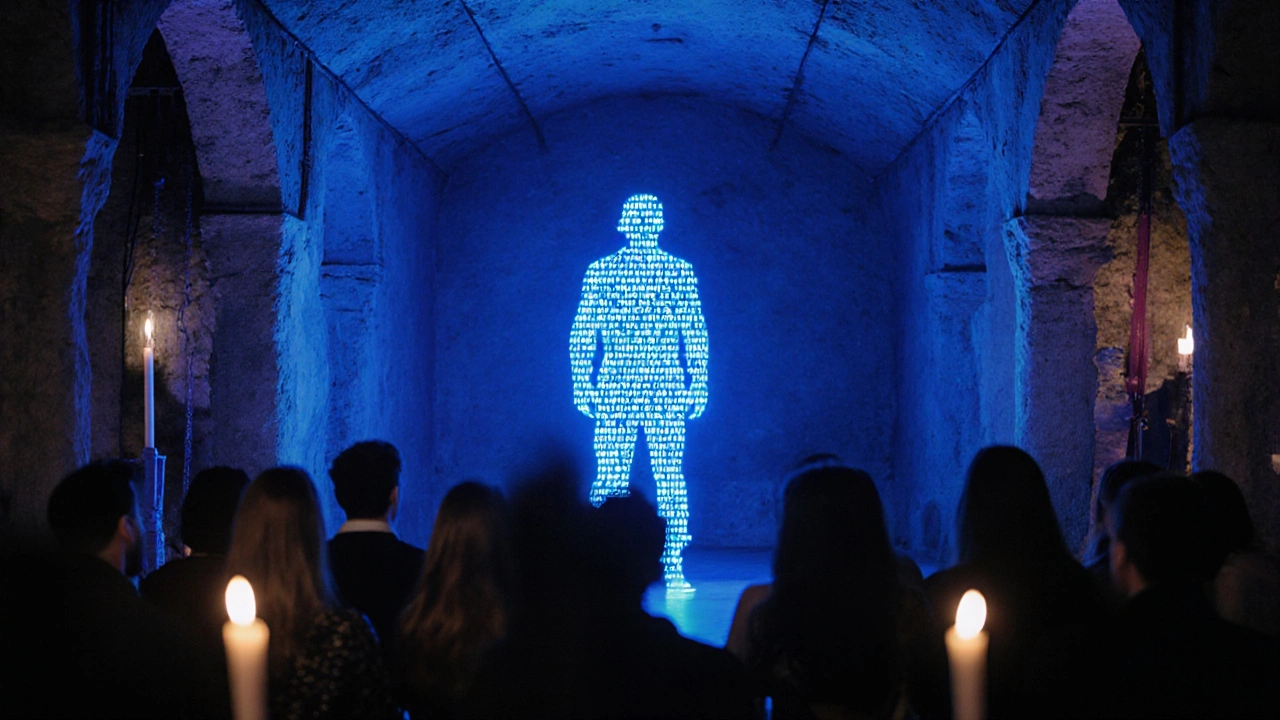
London doesn’t just host plays-it breathes them. By 2025, the city’s theatre scene is louder, wilder, and more diverse than ever, with festivals spilling out of the West End and into alleyways, warehouses, and even underground tube stations. If you think theatre in London means big lights, big prices, and big names, you’re missing the real heartbeat of the city’s performance culture.
The Fringe Is Everywhere Now
The Edinburgh Fringe gets all the press, but London’s fringe scene has grown into something just as raw and unforgettable. In 2025, over 800 independent shows will be staged across 120+ venues-from tiny rooms above pubs in Dalston to pop-up stages in the crypts of old churches in Clerkenwell. These aren’t tryouts for the West End. These are bold, weird, and often brilliant experiments in storytelling.
Look for London Fringe Festival, now in its 17th year, which runs from late July through August. It’s not just a list of shows-it’s a curated map of underground theatre. Last year, a one-woman show called Waiting for the Bus, performed entirely on a moving London bus, sold out every night and was later picked up by the Royal Court. That’s the kind of surprise you find here.
Unlike Edinburgh, where tickets are often booked months ahead, London fringe gives you flexibility. Many venues operate on a pay-what-you-can model, and walk-ups are welcome. You can stumble into a 7 p.m. show about AI-generated Shakespeare and walk out 90 minutes later with your worldview shifted.
West End Isn’t Just Big Budgets
The West End still dominates the headlines, but 2025 is different. Big productions aren’t just rehashing old hits. New adaptations are pushing boundaries. Frankenstein: The Machine, a co-production between the National Theatre and a tech startup using real-time motion capture, opened in March and has been selling out for months. The lead actor doesn’t wear a costume-he’s projected as a digital entity that shifts form with every line.
Meanwhile, traditional classics are getting fresh voices. The Donmar Warehouse’s revival of Hamlet casts a non-binary actor in the title role, with dialogue rewritten to reflect modern identity politics. Critics called it “unsettling” and “necessary.” Ticket demand is so high, they added a weekly 10 a.m. matinee for students.
And prices? Still steep, but not hopeless. The National Theatre’s £15 Tickets scheme offers 100 seats per show for under £15-no lottery, no waiting. Just show up early, pick your seat, and go. Over 12,000 people used it last year.
Hidden Gems You Won’t Find on Google
Some of the most powerful theatre in London happens where no tourist guide dares to look. In Peckham, the Blackheath Halls host Voices of the Suburb, a monthly series where local residents write and perform monologues based on their lives. One 72-year-old grandmother told her story of fleeing Uganda in 1972-no props, no lights, just her voice. The audience sat silent for a full minute after she finished.
In Walthamstow, the Walthamstow Pumphouse turns an old water pumping station into a sound-based theatre space. Their 2025 show, Whispers of the Thames, uses binaural audio and spatial speakers to make you feel like you’re walking along the riverbank with ghosts of dockworkers from the 1800s. You wear headphones. You sit on benches. You don’t see a single actor.
And then there’s the London Underground Theatre Project, which has been staging 15-minute plays on the Central Line during off-peak hours. You board a train. A performer steps out from the crowd. Five minutes in, they start reciting poetry about immigration. You get off at Oxford Circus. The show ends. You never knew it was happening until it was over.

Festivals Beyond Fringe
London’s theatre calendar isn’t just about August. In May, the London International Mime Festival brings silent, physical theatre from Japan, Poland, and Brazil to venues like Sadler’s Wells. No words. Just bodies moving in ways that make you question what language even means.
Every September, the London Queer Theatre Festival returns with over 40 shows exploring gender, love, and resistance. Last year’s standout was Transcendence, a musical performed entirely by trans and non-binary artists using voice modulation tech to blend singing styles across decades.
And don’t miss the London Latinx Theatre Festival, now in its fifth year. It’s the only festival in the UK dedicated to Spanish- and Portuguese-language theatre, with performances translated live into English via headphones. One play, La Noche de los Milagros, was performed in a converted laundromat in Brixton. You sat on folding chairs while laundry machines clanked in the background.
How to Plan Your 2025 Theatre Trip
- Start with a theme: Are you into experimental sound? Political drama? Physical theatre? Pick one focus and follow the festivals that match.
- Buy tickets early for West End: Shows like Hamilton or The Lion King sell out weeks ahead. Use official sites only-no third-party resellers.
- Go late for fringe: Many fringe shows lower prices after the first week. Shows that didn’t sell out on opening night? You might get in for £5.
- Use the London Theatre Pass: This new program gives you 30% off tickets to 50+ venues across the city, including fringe spaces. £45 for a month, valid for anyone under 30 or over 65.
- Follow local blogs: Sites like London Theatre 1 and What’s On in London update daily with last-minute cancellations and hidden pop-ups.

What’s Changing in 2025
This year, the Mayor of London launched a £2 million fund to support small theatre spaces that use sustainable practices. Expect more shows powered by solar panels, sets built from recycled materials, and zero single-use plastic in lobbies. The Old Vic’s new production of Macbeth uses costumes made from upcycled curtains and old theatre drapes.
Accessibility is improving too. All major venues now offer audio description, captioning, and sensory-friendly performances. The Barbican’s Quiet Nights series lets people with autism or sensory sensitivities attend shows with lowered lights, no sudden sounds, and space to move around.
And for the first time, AI-generated subtitles are being tested in real time for non-English performances. A Spanish play in Camden now shows live translations on your phone via QR code-no headset needed.
Why This Matters
Theatre in London isn’t just entertainment. It’s a mirror. It reflects who we are, who we’re becoming, and who we’ve forgotten. The Fringe gives voice to the unheard. The West End challenges what we think we know. The hidden spaces remind us that art doesn’t need a stage-it just needs someone willing to listen.
In 2025, you don’t need a ticket to a big-name show to feel something powerful. Sometimes, all you need is a bus ride, a dark basement, or a quiet moment on a train.
Are London theatre festivals only in August?
No. While August is peak fringe season, London has major theatre festivals year-round. The London International Mime Festival runs in May, the London Queer Theatre Festival in September, and the London Latinx Theatre Festival in October. Even in winter, venues like the Royal Court and the Donmar Warehouse host bold new plays.
Can I really get cheap tickets to West End shows?
Yes. The National Theatre’s £15 ticket scheme offers 100 seats per show at that price-no lottery, no waiting. Other venues like the Old Vic and Shakespeare’s Globe offer similar deals. Look for “Rush Tickets” or “Standing Room” options, which are often under £20 and available the day of the show.
What’s the difference between fringe and West End theatre?
West End shows are large-scale, professionally funded productions with big budgets, famous actors, and long runs. Fringe theatre is small, independent, and experimental. Fringe shows often have no budget, no lighting crew, and sometimes no fixed stage-but they’re where innovation happens. Many West End hits, like One Man, Two Guvnors, started as fringe shows.
Do I need to book tickets months in advance?
For West End shows like Hamilton or Wicked, yes-book at least 2-3 months ahead. For fringe shows, you can often walk in the day of, especially after the first week. Many fringe venues have low attendance early on and drop prices to fill seats.
Are there theatre options for people with disabilities?
Absolutely. All major venues now offer audio description, British Sign Language (BSL) interpreted performances, captioned shows, and sensory-friendly sessions. The Barbican’s Quiet Nights series is designed for neurodivergent audiences. Many fringe venues also provide wheelchair access and flexible seating.
Can I watch theatre outside of central London?
Yes, and you should. Some of the most powerful performances happen in Peckham, Walthamstow, Brixton, and Croydon. The London Underground Theatre Project even stages shows on the Central Line. Local venues often have lower prices and more intimate experiences than central London theatres.